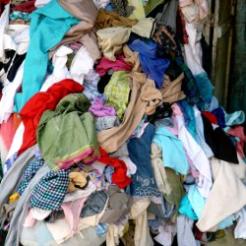The decision undertaken by a number of local councils not to award house-to-house clothing collection contracts to two related companies as the proportion of proceeds going to charity were deemed too low has been overturned by the Cabinet Office.
Cardiff Council refused to grant Support Pen-Y-Bont Ltd and Support Hollies School Ltd contracts in 2011. Both organisations, which share the same directors, had been granted previous contracts to collect in the city. But analysis of the results of the previous contracts showed that in the case of Pen-Y-Bont just 6.4 per cent and 7.2 per cent of proceeds were gleaned for the Y Bont charity and Support Hollies donated 8.9 per cent of its proceeds to charity.
Other councils, including the Vale of Glamorgan, took the same decision based on the same reasoning, but following an appeal to the Cabinet Office by the organisations’ directors, Aleksej Plachtej and Jakub Czerneki the decisions have been overruled.
A spokesperson for Cardiff Council advised that the organisations have now been able to commence their new contract without the need to reapply.
The Cabinet Office decision is based on the House-to-House Collections Act of 1939 which states that applications may be refused if "The total amount likely to be applied for charitable purposes as the result of the collection including the amount already so applied is inadequate in proportion to the proceeds likely to be received". However no definition of acceptable proportions is made.
Accepting the directors' appeal, the Cabinet Office said that: “As far as (the proportionality test) is concerned, it is appreciated that, for a number of reasons, the costs of conducting house-to-house collections of second-hand clothing tend to be higher than, for example, collections of cash.” The central government department added that charities undertaking collections on their own behalf are “likely to face similar costs”.
Costs 'not unreasonable'
Support Pen-Y-Bont received £8,338 as proceeds for its first collection between June and December 2010. In a statement of return it listed costs as: £39 legal and professional fees; £33 equipment hire; £10 telephone; £7 insurances; £4,315 wages of distributors/collectors; £284 motor expenses; £3,154 for “garment bags”. £537 was received by the charity.
The Cabinet Office advised that, “As for (the excessive remuneration test) the Minister is not persuaded that remuneration or expenses that would be paid out to any persons involved in organising or conducting the collection are at a level that is unreasonable given the work involved in undertaking this type of collection.”
The Local Government Act 1972 transferred responsibility for the licensing of street and house to house charitable collections to local authorities from the police, except in London where responsibility remains with the Metropolitan Police and the City of London Police. But organisations retain the right to appeal.
In a response to the decision local Liberal Democrat councillor Ed Bridges condemned the Cabinet Office's ruling, stating that "the citizens of Cardiff expect the bulk of proceeds from the clothes they donate to go to charity and they would see 6.4 per cent as miserly. I am very disappointed by the decision of the Cabinet Office and I think the citizens of Cardiff have been poorly served by that judgment..."
However speaking on behalf of the Public Fundraising Regulatory Association, Toby Ganley, head of policy, said the responsibility should lie with the charities involved: "Charity trustees have a legal fiduciary responsibility to ensure that they spend their resources appropriately, for which they are accountable to the Charity Commission. If they have decided a particular collection is a reasonable return on investment, it should not be up to a council to overrule this decision."
The Charity Retail Association said: “House-to-house collections can be a convenient way for people to donate to charity, but if members of the public are unsure or concerned about return rates for collections we advise that they donate directly to charity shops, which rely on donations of unwanted clothing and other items and where they can be confident that 100 per cent of the profit goes to charity.”
Who do you think should be responsible for the decision? Take our quick poll by clicking here.









